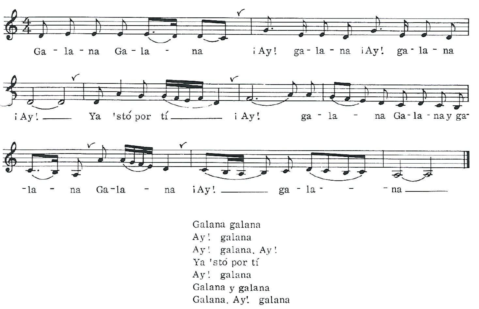The 78rpm recordings that are still emerging from archives around the world offer unique vistas on past musical cultures. These findings show the extent to which repertoires of traditional music have evolved in the century or more since commercial recordings became a widespread product. Notably, the old recordings show, among many other matters, that widely popular songs from the turn of the 20th century are absent from late 20th century revivalist trends of these same repertoires. The Ladino or Judeo-Spanish song repertoire is an exemplary example of this phenomenon.
La galana, a Judeo-Spanish song included in the new publication of the JMRC, Eastern Mediterranean Judeo-Spanish Songs from the EMI Archive Trust (1907-1912), is one of the many popular Sephardi songs that have not entered the canon of the modern discography. It also barely survived in the Sephardic oral traditions which were recorded in ethnographic pursuits since the mid-20th century.
The song was apparently very popular at the time it was recorded commercially in Istanbul in 1909 by the Compagnie Espagnole de Salonique (CES), a studio ensemble comprising the most popular Sephardic singers of Salonica. It was still mentioned in an article in the Ladino journal El Mesajero (Salonica, 1939) that, referring to members of this ensemble, cites a fragment from La galana (Bunis 1999, English section, p. 329, note 87).
Example 1. La galana, Compagnie Espagnole de Salonique
Moreover, the EMI Archive includes another recording of the song, this one by singer Elie Cohen. He recorded a slightly shorter version of La galana (in makam Hüseyni) entitled 'Sultana' that is notwithstanding very similar to the CES recording.
Example 2. La galana, Elie Cohen
Here is a comparison of the texts in both recordings:
|
Compagnie Espagnole |
Elie Cohen
|
|
Sufriendo siempre, siempre, yaré, sufriendo siempre, siempre, parezco. Kale olvidarmos lo que tengo, esto por mí no salga loco. Matarme, matarme, matarme, matarme, galana, galana. Ay ya yürek. Miri lo que va, que va, que va, miri lo que va, que va, que va Por ti galana, galana ah ya yürek, ya yürek, ah ya yürek, ya yürek, ah ya yürek. Por ti galana, galana, por ti galana, galana Ah ya yürek. Me kale hacerte porque me agradecerte siempre. A todo que yo kale me contente a todo que kale me contente. Matar, matarme, matarme. matarme, galana, galana, Ah yürek. Miri lo que va, miri lo que va por ti galana, galana. Ah ya yürek, ya yürek, por ti galana, por ti galana, galana. Yarem, ah, amán, amán. |
Sufriendo siempre y siempre, yürek, ah. Kale olvidarme todo lo que yo tengo. Esto por ti non salga loco. Matarme, matarme, matarme, matar galana y galana, galana, ah, ya yürek. Mírelo y que hay, que hay, que hay mírelo y que hay, que hay, que hay. Por ti galana y galana ah ya yürek, ya yürek, ah ya yürek, ya yürek, ah ya yürek. Por ti Sultana, por ti galana y galana, galana ah ya yürek, ah yarem, yarem, amán. |
The song is found among Sephardim from the Island of Rhodes. Two versions from Rhodes are a written version published by Amato-Levy (1987, p. 141) and an audio recording by Roza Avzaradel (National Library of Israel, Sound Archive, Y 05824a, recorded by Susana Weich Shahak, June 6, 1991). Avzaradel, who possessed one of the richest living memories of the song in Ladino, describes in this recording to Weich Shahak that La galana was a wedding song. In the conversation following the song she conveys interesting information regarding the content and meaning of the text, such as the transformation of the Turkish “ya yürek” (oh, heart) to “ya Yuri” (Yuri being the name of the groom) and the name of the bride, “Sultana” in Elie Cohen’s recording, becoming “Shoshaha/Rosina.”
Example 3. La galana, Roza Avzaradel (NSA Y 05824a)
Here is the transcription of Avzaradel’s text showing that in fact, oral memory may have preserved a more integral version of the song than the old 78rpm recordings.
Yo quería ser
‘l patrón de esta güerta
Cortar las flores
y cerrar la puerta.
Morir, me muero,
A ti yo te quiero
Me muero, a ti yo te quiero.
Of, que hermosa es la noche
La hora d’amanecer
Non amentí
De a ti parecer
Galana y galana
Shoshana, sal por la ventana
Rosina, sal por la cocina.
Me riflo y queda
Queda y queda y queda
Por ti ya Yuri, ya Yuri
Por ti ya Yuri
Por ti, por ti yo me muero
Ya Yuri, así yo te quiero. (2)
Kale olvidarme
Todo lo que yo penso.
Penso en ti, no salgas loco
Morir me muero,
A ti yo te quiero.
Ya Yuri, yo a ti te quiero
Yo quería ser
Por ser agradeciente
El mundo entero
Debía ser parientes
Morir me muero
Galana y galana
Shoshana, sal de la ventana
Rosina, sal de la cocina. (2)
Another vestige of La galana appears in Isaac Levy’s Chants judeo-espagnols (vol. II [1970], no. 33). This is a very truncated version of the refrain with a version of the melody that in fact echoes the CES recording.

Figure 1. La galana from Isaac Levy’s Chants judeo-espagnols (1970)
Another interesting version was preserved in the Bulgarian Sephardic tradition. The distinguished ethnomusicologist Nikolai Kaufmann collected the song and arranged it for choir, in the spirit of the modernist approach to folk songs characteristic of the twentieth-century Bulgarian school of composition. His modern polyphonic arrangement was recorded by the choir “Voices of Vitiz” (of the Bulgarian Academy for Performing Arts) conducted by Roumen Tsonev in the CD Jewish Songs from Bulgaria. The song itself starts at 00:30, after a theatrical introduction. The Turkish “ya yürek” (oh, heart) in the refrain of the CES 78rpm recording that became “ya Yuri” in Roza Avzaradel’s version turns apparently into “ya llori” (“I cried”).
Me rami[?] llores
sto moreno
Por ti galana,
galana ya llorí
Galana, galana,
Ya llorí.
Kale olvidarme
Lo que yo ??
Mato por mí,
no salgas loco
Matar, matarlo,
Ay, galana, galana,
Galana, ya yo llorí.
Galana, la misma [?] galana llorí ya.
This short excursion into one of the songs included in our new production shows the extent to which detailed research complicates the paths of transmission of the songs in Judeo-Spanish and shows the elusive modern destiny of old lyrical verses. The verses of La galana in all their permutations indeed recall layers of a Hispanic tradition of medieval origins.
References
Amato Levy, Rebecca. I Remember Rhodes. New York: Sepher-Hermon Press, 1987.
Bunis, David. Voices from Jewish Salonika: Selections from the Judezmo Satirical Series ‘Tio Ezrá y Su Mujer Benuta’ and ‘Tio Bohor y Su Mujer Djamila’ by Moshé Cazés. Jerusalem: Misgav Yerushalayim-The National Authority for Ladino; Thessaloniki: The Ets Ahaim Foundation, 1999.






